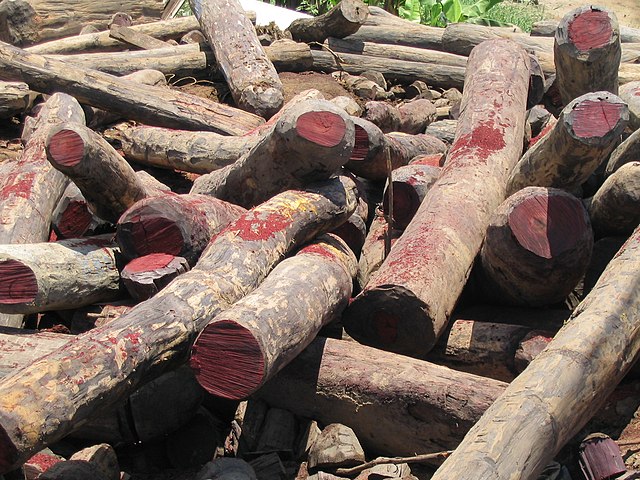The note from Minister Alphonse Charles Wright cites allegations concerning illegal logging, violating timber trade regulations, corrupting public officials, public funds embezzlement and forgery.
The officials appear to have been involved in issuing fake export certificates for at least 377 containers (6,409 metric tonnes) of Pterocarpus erinaceus, or Kosso, a protected rosewood tree native to semi-arid forests of West Africa.
In recent years, Kosso populations, falling victim to the surging demand for rosewood in China, have been critically depleted. In June 2022, CITES, a multilateral body regulating wildlife trade, resorted to suspending trade in Kosso in all 16 West African countries where the tree is found.
In Guinea in particular, trade in Kosso was banned already in 2013 following CITES sanctions.
The sanctions, initially motivated by Guinea’s issuance of fraudulent trade permits for gorillas and chimpanzees, prevent the country from participating in trade of all 40,900 species currently listed as protected under CITES.
That said, in April 2021, Guinea was granted an exception to export its pre-2013 Kosso stock, assessed at 12,882 metric tonnes, with the export itself subject to a quota of 14,000 metric tonnes.
The agreement required Guinea to allocate 40% of the proceeds from the export towards wildlife conservation.
In October this year, a CITES delegation visiting Guinea found that while the stock had been emptied, the responsible officials were unable to specify for how much it was sold, nor to provide any sales documentation.
Upon consulting the shipping company responsible for the export, the delegation was informed that over 1,200 containers of Kosso (20,400 metric tonnes) had left the country in the designated period – a figure corroborated by export certificates received by CITES authorities in China.
It is not yet clear where the surplus of at least 7,517 metric tonnes came from.
An expert consulted by CITES, analyzing photos of the cargo received from customs in China, indicated some logs appeared more recent than others, owing to their still reddish color.
Sekou Amadou Diakite, National Coordinator at RENASCEDD, a local environmental NGO, said the possibility of ongoing logging operations could not be ruled out, describing the findings as concerning.
“That’s why we will fight for the investigation to be completed, so that everything can be clarified,” he told OCCRP.
A recent report by the Environmental Investigation Agency notes that the CITES suspension of trade in Kosso limited international trafficking but did not eliminate it, with some notable breaches observed in Ghana and Mali.

